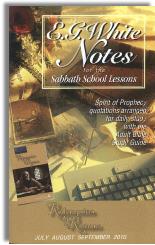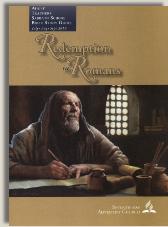|
||||||||||||||
Commentary on "Victory Over Sin"
Day 2: Sunday, August 15, 2010 - Bound to the Law?
Overview
Sunday’s lesson states that the overall context of Romans 7 deals with the “system of worship” involving animal sacrifices and feast days given at Sinai. That is the “law” that Paul says Christians are no longer bound to. Paul is trying to persuade the Jews that they must abandon the old system of worship because the Messiah had come. The lesson asserts that the Jewish Christians Paul was addressing wanted to stay “married” to that system, but because Messiah had died, that part of the law died with him. Now free from that worship system, they had Christ’s help to successfully keep the remaining parts of the law.
Paul couldn’t have been saying that the 10 commandments are no longer binding, the lesson concludes, given what the rest of scripture teaches about the law. Those who use Romans 7 to teach that the Commandments are abolished are really just trying to take away the Sabbath and replace it with Sunday.
Observations
This lesson avoids most of Paul’s carefully constructed arguments on the law in Romans 7, and instead concentrates its efforts on defending the Ten Commandments. To have part of the law preserved in the present, and part of it abandoned, the lesson must divide the law into parts. The distinction is made between ceremonial laws, which ended at the Cross, and a moral law, which is eternal. To know how we can tell which part of the law Paul is referring to, the lesson does not tell us. This makes reading Romans 7 a confusing chore.
Firstly, nowhere in Scripture is any distinction made between moral, ceremonial, or civil laws. The entire week’s lesson is built on that artificial foundation, and does not allow a plain reading of Romans. In Matthew 5, Jesus made it clear that no one can remove any part of the law until all is fulfilled. Christians must die to the entire law, or none at all.
Secondly, Paul’s examples from the law are from the 10 Commandments, the part that the lesson claims are separate. His first illustration uses the 7th commandment against adultery in vss. 1-3. His second illustration is taken from the 10th commandment against coveting in vs. 7. The law against coveting is the law that sin uses to kill him. He says nothing here about the old “system of worship.” We can see, then, that what Paul says we must die to are written codes, “for the letter kills.” We don’t die to an abstract thing called a “worship system.” Gentiles were never participants in that system.
Third, this law stirs up sin in him, because of its prohibitions against his desires. The commandment against coveting stirs up a rebellious response—to covet all the more! And so it is with all the commandments, the more we try to follow them, the more they arouse our sinful passions to break them. I am reminded of the high school students that I work with. If we try to change their unruly behaviors by merely commanding them not to do them, they rebel all the more. With the written code of law, we are all like rebellious adolescents, for written codes stir up our desire to rebel. The purpose of the law is to reveal sin, and show it to be “exceedingly sinful.”
Fourth, Romans was written to the church in Rome, which consisted of both Jews and Gentiles. The message of Romans 7, therefore, must apply to all believers. The Gentile Christians were not clinging to the sacrificial system of worship, but they did struggle with coveting, stealing, adultery, etc. Paul is speaking to the universal problem of sin which still dwells in every believer. As long as we are alive to any part of the law, sin will continue to reign in us. The answer is to die with Christ and live in Him as a new creature. As new creatures we are no longer under the law, no part of it can have any claim over us, because we belong to Another.
We can agree that there is an eternal “Moral Law,” that can be found within Moses’ law. Jesus stated that the two great commandments are to love God with our entire being, and our neighbor as ourselves (Matt. 22). Later, John would state this as one command in I John 3:22, 23), saying that we
“receive from Him anything we ask, because we obey his commands and do what pleases him. And this is his command: to believe in the name of His Son, Jesus Christ, and to love one another as he commanded us.”
So the law has not been abolished, or even selected parts of it. Jesus has fulfilled every part of it, and it is completely fulfilled in us (Romans 8:4). We will look more closely at how Christians fulfill the requirements of the law this week.
Summary
- The lesson makes artificial distinctions between moral and ceremonial parts of the law, making some of the law dispensable. However, Jesus says the law is indivisible. Therefore, we must be released from the whole law, or none of it.
- We know Paul is writing of the whole law because: a) His examples from the law are from the 10 Commandments; b) the law can only stir up sin, not remove it; and, c) Roman Christians were not all Jews, so many of them weren’t clinging to the Jewish “system of worship.”
- There is an eternal Moral Law, which Jesus stated is to love God wholly, and our neighbor as our selves. That is the law in us that fulfills all other laws.
Copyright 2010 BibleStudiesForAdventists.com. All rights reserved. Revised August 14, 2010. This website is published by Life Assurance Ministries, Glendale, Arizona, USA, the publisher of Proclamation! Magazine. Contact email: BibleStudiesForAdventists@gmail.com.
The Sabbath School Bible Study Guide and the corresponding E.G. White Notes are published by Pacific Press Publishing Association, which is owned and operated by the Seventh-day Adventist church. The current quarter's editions are pictured above.
Official Adventist Resources
Standard Edition Study Guide Week 8
Teacher's Edition Study Guide Week 8
Easy Reading Edition Study Guide Wk 8
Search the Complete Published Ellen G. White Writings


